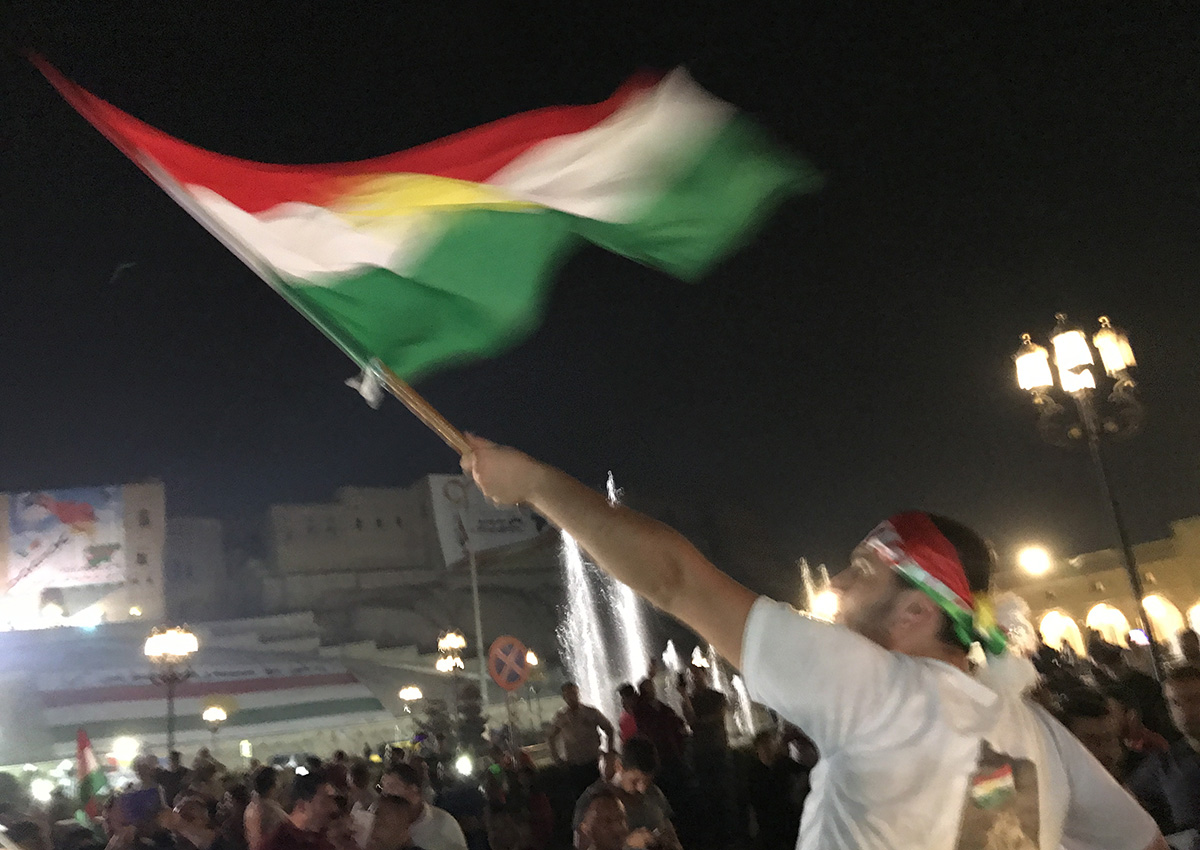Canadian Forces in northern Iraq are facing new uncertainty about their ongoing military operation against the so-called Islamic State following the Kurdish independence referendum.

For the past three years, Canadian troops have been based in Iraq’s semi-autonomous region of Kurdistan, providing support for both Kurdish and Iraqi forces in their fight against ISIS. But the Kurdish independence referendum, which saw an overwhelming majority vote in favour of separating from Iraq, has raised fears that the Kurds and Iraqis may soon point their weapons away from ISIS and towards each other.
READ MORE: Canada’s new role in helping Iraqi forces: Remove thousands of ISIS booby-traps
The vote is not legally-binding and the Kurdish government hopes the result will strengthen its hand in future negotiations with the Iraqi government. But thus far, Baghdad has shown little interest in any such negotiations.
WATCH: Iraqi Kurds celebrating after voting in historic independence referendum

Iraq’s furious response to the referendum has thus far included closing Kurdish airspace and threatening to use Iraqi troops to reclaim disputed territories by force if necessary. One commander with the Peshmerga, the Kurdish military, told Global News in Iraq that parts of the country could soon descend into civil war.

Get daily National news
“We’re monitoring the situation,” Canada’s Brigadier-General Daniel MacIsaac told Global News at the Canadian Forces base in the Kurdish capital of Erbil. “I’m not aware of any indications of warnings of a threat to our people at all related to the referendum.”
READ MORE: Iraqi Kurds vote 92% in favour of creating an independent state
MacIsaac says they’ve taken steps to ensure the base, which is currently home to about 150 Canadian military personnel, has enough supplies to withstand any potential embargoes Iraq or its neighbours Turkey and Iran place on Kurdistan.
“Canada is committed to a stable, diverse and unified Iraq,” MacIsaac said.
READ MORE: Justin Trudeau stays mum on Iraq referendum, citing Quebec as a lesson
But Canada’s very presence in Kurdish territory is an irritant for some in Baghdad.
- ‘Something just went off’: Canadians in Middle East describe ‘surreal’ Iran missile strikes
- Queen’s University students stranded in Doha after Iran attack shuts down airspace
- Khamenei’s death met with ‘jubilation’ among Iranian-Canadians: Liberal MP
- ‘At first I cried’: How Iranian Canadians are reacting to the U.S. strikes in Iran
Following the referendum, Iraq’s parliament passed a motion calling on all foreign governments to withdraw their diplomatic missions in Kurdistan (Canada currently has a mission in Baghdad and a diplomatic office in Erbil) as some Shia parties have been pushing for a departure date for foreign troops.
Canada’s presence in Kurdistan was born more out of practicality than any political allegiance. When ISIS began conquering large swaths of the country in 2014, Iraq’s military was in shambles. So the Canadians teamed up with the vaunted Kurdish Peshmerga, which proved a much more formidable fighting force in halting the ISIS advance.
“Canada has been a close friend of the Kurds,” said Renad Mansour, an Iraqi-Canadian expert on Middle Eastern affairs at Chatham House in London, England. But now that the battle against ISIS in Iraq is nearly won and Kurdistan has voted for independence, Mansour says Canada is in an awkward spot.
READ MORE: Iraq’s prime minister declares ‘total victory’ in Mosul battle
“Baghdad, either because it didn’t have a choice or out of desperation, was forced to kind of accept the fact that you have foreign governments directly financing, arming, training one of its regions.
But this is not a norm, or a status quo, that Baghdad is looking to maintain.”
Despite its close relationship with Kurdistan, Canada was one of many western countries that urged the Kurds not to hold the independence referendum, worried it would destabilize the region and allow ISIS to claw its way back from the brink of defeat.
The Canadian government’s position was both a surprise and a disappointment to Ferhang Afandi.
The Kurdish-Canadian moved from Toronto to Erbil in 2014 to join the Peshmerga and help fight ISIS.
“It hurts,” Afandi says about Canada’s opposition to the referendum. “It really hurts, especially because Canada is my country. They know what democracy is.”
Afandi believes that ISIS has been defeated in Iraq to the point of no return, and argues that a western-friendly, independent Kurdistan would provide stability in the Middle East. But if Iraq’s military tries to forcibly reclaim disputed territories, such as oil-rich Kirkuk, which are claimed by both sides, Afandi says he is prepared to fight.
“I hope it never happens. But if it happens, you know what? Freedom is not free. We have the right to defend ourselves.”








Comments
Want to discuss? Please read our Commenting Policy first.